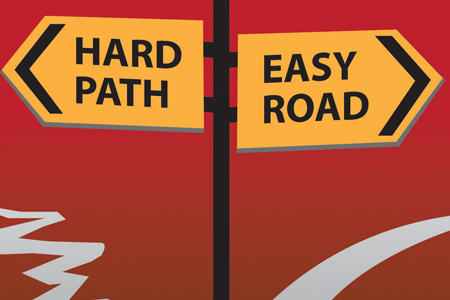
Dilwar Hussain - Making Religion a Burden
Issue 96 September
The Prophet said, “Make things easy for the people...” but today’s Muslims seem to want to make things as hard as possible.
When one reads the sources of Islam, there is a clear sense that being a Muslim entails a serious degree of engagement and commitment—one cannot shirk duties, for example in supporting those one is responsible for, or standing up for the rights of the needy or oppressed; on the contrary, people should always seek to “promote good and counter wrong” (Qur’an, 3:110). Nor should one be spiritually neglectful—“Say: my prayers and sacrifice, my life and death, are all for God, Lord of the worlds.” (Qur’an, 6:162)—and exemplified are those “who remember God when they are standing, sitting and lying down.” (Qur’an, 3:191)
Commitment, hard work and struggle are therefore facts of every day life. The spirit of jihad (striving to our utmost) is precisely there to nurture inner strength and self-control when faced with tough circumstances, such as life always conjures up, so that people can confront adversity with dignity, composure and discipline. Knowing that “surely, with every hardship comes ease.” (Qur’an, 94:5).
This sense of serious commitment and fortitude however is not to be confused with deliberately making things difficult for ourselves. Nowadays it seems that some go out of their way to make things harder, feeling that the more pain we feel, the more ‘Islamic’ an act is. There is a gross misunderstanding that the path of religion should entail hardship and suffering in order for it to be ‘genuine’ and ‘authentic’. At the root of this lies the (conscious or sub-conscious) anxiety that this life is fundamentally at odds with our spiritual well-being, and it is a mere test for us to pass through. This is actually alien to the original spirit of Islam, which confirms that it is God who created us in a state of natural balance, in harmony with the rest of the universe around us. That we need to take time to enjoy, laugh, relax and have fun as well as do all the serious things in life. This is why the Prophet Muhammad taught his companions that “...there is an hour for this and an hour for that” (Muslim).
The idea that Muslims should try to live a life of balance and moderation goes to the heart of Islamic teachings. The Qur’an asserts: “We have made you a community that is of the middle path (wasat)...” (2:143)
Very boldly, the Prophet taught: “Make things easy for the people and do not make them difficult. Give good tidings to people and do not repel them” (Bukhari). It is said the Prophet was never confronted by two options but that he chose the easiest of them—a notion that became a guiding principle in usul al-fiqh. This is clear to see in the vision of Islam—it is here to facilitate and help us, not to burden us. As the Qur’an emphasises, “God desires ease for you, and not hardship.” (2:185)
Every day dispensations such as shortening and combining the prayers when travelling, the allowance for the sick to make up their fasts later, performing symbolic wudu (tayammum) when water is unavailable, the instruction of the Prophet to Imams to shorten the congregational prayers as the elderly, weak, and those that need to tend to their work, would be in the congregation—these, and so many other examples, all show the humanity and common sense of how this faith is intended to be practiced. In the realm of social interaction the Qur’an allows that we eat from the food of the People of the Book (5:5), because despite there being quite specific dietary laws in Islam the purpose is not to create a community that becomes isolated and breaks social ties, so common sense allowances and exceptions are built in to compensate.
When we look at so much of the lived practice of Muslims today however, on so many subjects, we will find ‘pious’ deviations from the original spirit of Islam causing its intended sense of balance and moderation to get lost in translation.Islam actually came to liberate us, as the humble Rabi ibn Amir said to the mighty Persian emperor, Rustum, that it came to free people from servitude to other human beings and to take them from “the narrowness of this world to the wide expanse of this world and the hereafter; and from the injustices of other religions to the justice of Islam.” (Al-Tabari)
For too many of us today, it seems, it has become a shackle such that narrowness and injustice are no strangers to us.
Dilwar Hussain is President of the Islamic Society of Britain.
Bookmark this |
|
Add to DIGG |
|
Add to del.icio.us |
|
Stumble this |
|
Share on Facebook |
|
Share this |
|
Send to a Friend |
|
Link to this |
|
Printer Friendly |
|
Print in plain text |
|


Comments
1 Comment
1
dasdas
6 Jan 13, 21:29
Houston
Texans Jersey
Indianapost
rongs Colts Jersey
Jacksonville
Jaguars Jersey
Kansas City
Chiefs Jersey
Miami
Dolphins Jersey
Minnesota
Vikings Jersey
New
England Patriots Jersey
New
Orleans Saints Jersey